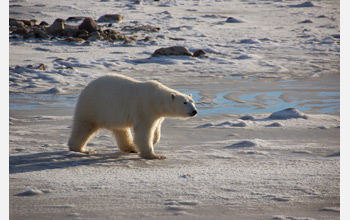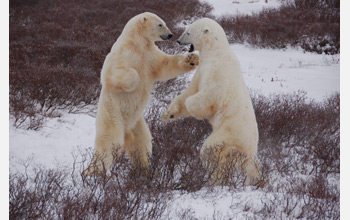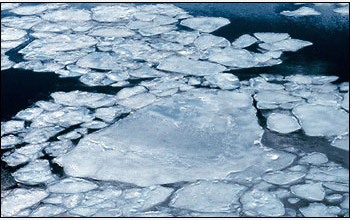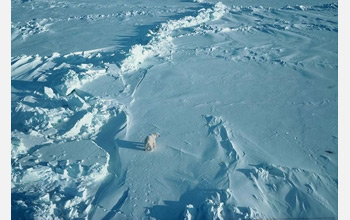All Images
News Release 10-236
Polar Bears: On Thin Ice? Extinction Can Be Averted, Scientists Say
Cutting greenhouse gases now is the key
This material is available primarily for archival purposes. Telephone numbers or other contact information may be out of date; please see current contact information at media contacts.

A female polar bear walks along the shore of Canada's Hudson Bay, waiting for ice to form.
Credit: Steven Amstrup, Polar Bears International
Download the high-resolution JPG version of the image. (788 KB)
Use your mouse to right-click (Mac users may need to Ctrl-click) the link above and choose the option that will save the file or target to your computer.

Greenhouse gas mitigation can reduce the loss of Arctic sea-ice--and polar bears.
Credit: NOAA
Download the high-resolution JPG version of the image. (151 KB)
Use your mouse to right-click (Mac users may need to Ctrl-click) the link above and choose the option that will save the file or target to your computer.

Arctic sea-ice continues to melt. Year by year, its extent is shrinking.
Credit: NASA
Download the high-resolution JPG version of the image. (1.3 MB)
Use your mouse to right-click (Mac users may need to Ctrl-click) the link above and choose the option that will save the file or target to your computer.

Two male polar bears playfully spar near Hudson Bay, where sea ice melts in summer and reforms in autumn. The bears need the ice to reach their prey, such as seals.
Credit: Steven Amstrup, Polar Bears International
Download the high-resolution JPG version of the image. (841 KB)
Use your mouse to right-click (Mac users may need to Ctrl-click) the link above and choose the option that will save the file or target to your computer.

Arctic "pancake" ice consists of round pieces ranging from inches to feet in diameter.
Credit: NOAA
Download the high-resolution JPG version of the image. (31 KB)
Use your mouse to right-click (Mac users may need to Ctrl-click) the link above and choose the option that will save the file or target to your computer.

Last of the polar bears? According to new research, the answer may be no.
Credit: Environment Canada
Download the high-resolution JPG version of the image. (72 KB)
Use your mouse to right-click (Mac users may need to Ctrl-click) the link above and choose the option that will save the file or target to your computer.
